|
| 2015 | JAN | FEB | MAR | APR | MAY | JUNE | JULY | AUG | SEP | OCT | NOV | DEC |
| 2016 | JAN | FEB | MAR | APR | MAY | JUNE | JULY | AUG | SEP | OCT | NOV | DEC |
| 2017 | JAN | FEB | MAR | APR | MAY | JUNE | JULY | AUG | SEP | OCT | NOV | DEC |
| 2018 | JAN | FEB | MAR | APR | MAY | JUNE | JULY | AUG | SEP | OCT | NOV | DEC |
| 2019 | JAN | FEB | MAR | APR | MAY | JUNE | JULY | AUG | SEP | OCT | NOV | DEC |
| 2020 | JAN | FEB | MAR | APR | MAY | JUNE | JULY | AUG | SEP | OCT | NOV | DEC |
| 2021 | JAN | FEB | MAR | APR | MAY | JUNE | JULY | AUG | SEP | OCT | NOV | DEC |
| 2022 | JAN | FEB | MAR | APR | MAY | JUNE | JULY | AUG | SEP | OCT | NOV | DEC |
| 2023 | JAN | FEB | MAR | APR | MAY | JUNE | JULY | AUG | SEP | OCT | NOV | DEC |
![]() Read current month's Daily Reflections
Read current month's Daily Reflections
![]() Table of Contents: Daily Reflections
Table of Contents: Daily Reflections
![]() Youtube Channel: Video Listing
Youtube Channel: Video Listing
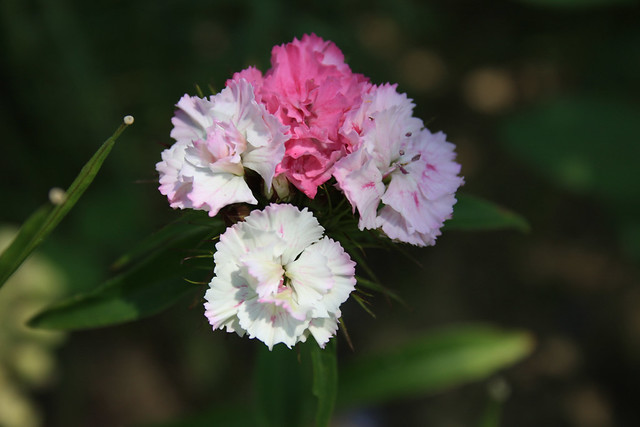
(Photo: Janet Kalisz)
Reflections November 2023
Many of us dread November's coming with its early darkness, frosty morns, and first ice and snow. October's bright leaves have all but blown away and the shapes of trees and denuded hills are evident. However, low-lying bushes still bear leaves, as do some of the oaks. Sounds carry widely: the hoot owl, coon dog, coyote, and freight train are all more pronounced because leaves no longer there muffle them. Winter's birds rule the roost with the departure of their fair-weather avian friends. There’s the he pleasant smell of wood smoke and rotting leaves. Let's celebrate.
Carnations You are a flower for all seasons; |
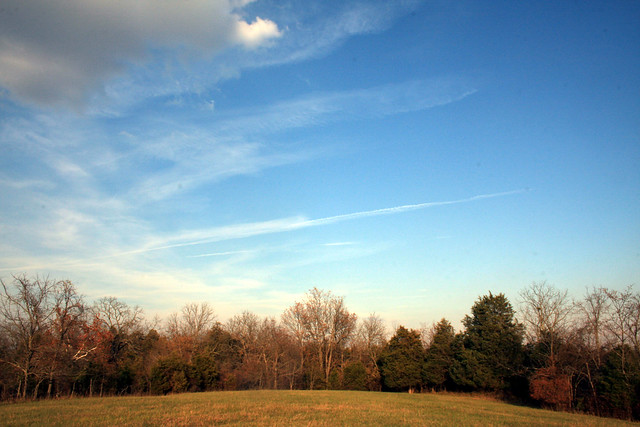
November sky in Kentucky.
(*photo credit)
November 1, 2023 Having a Saint for All Seasons
The Saints are part of our community of faith, for they assist us on our journey even though they have attained what they hoped for in their mortal lives. They have arrived and yet are active in helping us. So our travel in life includes heroic companionship. Some saints are popular ones who are known to travelers because of their own undertakings in life -- the ones who journeyed far and wide such as Thomas the Apostle, Francis Xavier, or Pope Martin I. Others stayed near home but were aware of the needs of those on the journey such as Theresa, the Little Flower. While popular saints are close to believers, still on this particular day we focus on others who are less well known -- either from the 20,000 or so recognized saints, or from holy people who we are quite confident are in the radiance of the Divine Light. Why not, for that is what All Saints Day is all about -- all of them?
Certain religious communities whose members are confident that one or other person has passed on before the throne of God, pray to them for intercession and protection. We are all one community and so seeing one or other as certainly arrived is not so hard to understand. A favorite acquaintance, friend, or relative may fit the bill of a model to uphold and converse with through prayer. Quite often, as in the case of saints who are on the road to public canonization, special favors are showered down. A person recovers good health after abandoning prescribed medicine; another feels protected from impending dangers; still another is grateful for securing a job after much frustration searching for the right employment. Favors received encourage petitioners to continue prayerful conversations.
Some of us rarely make such petitions, being convinced that God's will is being done at all times and that what we need most is willingness to perceive and obey the divine will. Do saints help? Yes, and all Christians hold that the community in prayer helps -- no exceptions. We need support for that prevailing openness to believe. Differences are in portions to believers who hold the saints have a special role. Many of us see the great need to have models in life and so we look often to the lives of the popular saints for inspiration -- as well as to the lives of heroic individuals who do God's work in simple ways. They stand ready to help as part of the divine family, and challenge us to see our needs as a family affair.
It is good to know that the power of the saints extends to a broader community and not to rare occasion or a privileged few. We all know people who most certainly have suffered enough in life and in passing are close to God. Surely a loving and merciful Lord will give them special favor at this time if we ask. It is spiritually praiseworthy to hunt and discover those who endured the vicissitudes of life to merit a crown of glory -- and that glory is a readiness to assist those mortal ones in need.
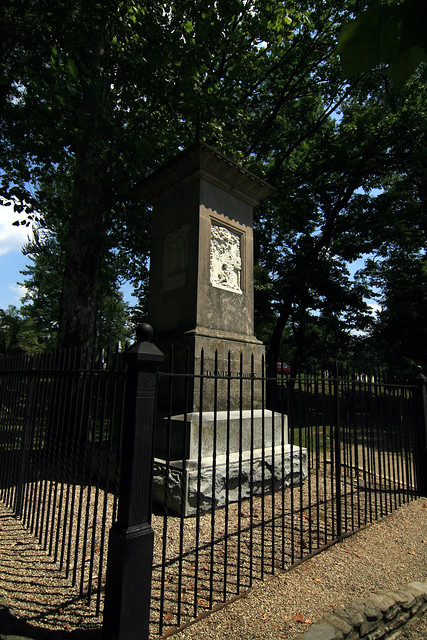
Daniel Boone grave marker, Frankfort, KY.
(*photo credit)
November 2, 2023 Remembering the Poor Souls
Today we focus on the holy departed souls; we recall people who struggled during their journey of life and never quite become a sparkling polished gem during that journey. We make no judgments for that is in the hands of God, but we prudently suspect that they really need our prayers during the process of purification that occurs in the life “beyond” in purgatory. Each must be purified in order to approach the face of God. Love and concern draw us to pray for them for a period after death.
Let's now be daring and couple this feast with that of the birthday of the famous explorer of 300 years ago, Daniel Boone. He certainly was a "poor soul" during his mortal sojourn, though hopefully attained his final goal a long time ago. He should have died with dignity as father of the Commonwealth of Kentucky; however, honors eluded him, for Boone was itinerant and never fully established roots anywhere. He was born in Pennsylvania and moved when young with his family to North Carolina. He took part in the 1755 Braddock campaign, which was disastrous. After serving as a frontiersman in Kentucky (including a year or so near my home in Mason County in the 1780s), he moved to West Virginia in 1788. One decade later Boone regarded the eastern wilderness as too crowded, crossed the Mississippi and settled in Missouri, where he died in 1820. He held several locally elected offices but no deep roots.
In 1775 Boone was hired by the Transylvania Company to chop a trail through Cumberland Gap to the Kentucky River.101000 However, war ensued and he was hard pressed to hold the small Boonesborough Fort settlement together. He was a prisoner of the Shawnee Indians, but escaped after having actually befriended his captors. He saw relatives incur violent deaths, including close relatives in the Battle of Bluelicks. He was robbed of $20,000 that was entrusted to him for land purchases during and immediately after this period. He could have been the "father of Kentucky" and yet Virginia retained the future state Kentucky until 1792. He lost title to thousands of acres of land he surveyed in what would be the bluegrass state, these titles voided due to improper entry into record books. Sadly, he left Kentucky indebted -- not lauded. After settling in Missouri, he returned to pay debts.
His exact Missouri grave was disputed when his body was presumed removed and brought back to Kentucky in the mid-nineteenth century. But in this state's Frankfort cemetery he was still a poor soul, for his grave stone was damaged by souvenir seekers. To add to the tale of woe, the only major Kentucky highway named after him was later renamed for an elected official. Yes, Boone is a legend, but legends tend to gloss over life's misfortunes. Daniel Boone was creative, easy going and hospitable, and amid all of life's vicissitudes did not surrender to cynicism. Boone was basically a model "poor soul."
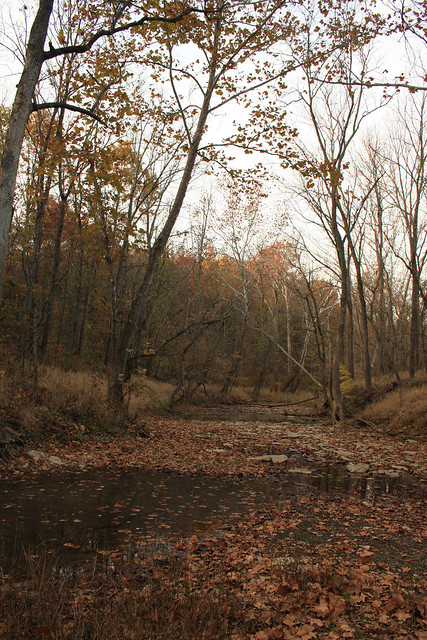
Fallen leaves in Chaplin River, Washington Co., KY.
(*photo credit)
November 3, 2023 Observing World Community Day
The ecumenical Church Women United Sponsor World Community Day on the first Friday of each November. They say that through God our hands can heal. And through healing we will ultimately get a sound Earth habitat so that our community may prosper. We can approach this task globally by a top-down approach, or we can focus on local issues and hope through the ripple effect that more and more local communities will seek cooperative ventures. However, a more integral approach would not be an either/or but a both/and approach. An emerging global community demands healthy and self-regulating local communities at the grassroots, and grassroots organizations need networks for communications.
Some would say it is necessary to first address critical global environmental issues -- and this is true as far as it goes. But climate change cooperation is a dream for moving a variety of nations with multiple political and economic interests and is not easy. "Environment" is a broad issue and to harp on critical issues frustrates people hearing what must be done and feeling powerless.
Local community enhancement is of utter importance. Here we are able to perceive and become involved more easily; we are able to see results first hand. The beauty of improving an environment and human relations by day-by-day practices is as important to the total human ecology as the pressure to say things constantly about what others must do. At the local level we are more able to pass on our learned experience to others near at hand. Enthusiasm can be contagious and youth as well as adults can benefit. The neighboring communities benefit by observation and word of mouth, and mutual exchange can quickly adapt to successful practices.
Global agencies must work together, such as the World Health Organization and its global attention to eradicating AIDS, polio, tobacco smoking, and drug problems. The Ebola epidemic teaches us that full cooperation by all types of global agencies is necessary to contain and halt its spread. Never before in human history has the unity of purpose and goals so overlapped on the level of all major religions and authentic movements. We must work for unity in such ventures: world courts and administration of justice; world police, maritime and peacemaking functions; world economic agreements for better or worse; world trusteeship over Antarctica and ocean wildlife zones; world regulation of use of the air travel and oceanic shipping; world cooperative endeavors to deal with epidemics and health problems; world warning systems for climatic changes and natural disasters; world communications and Internet regulations; the Geneva Convention; world sanctions on trade in endangered species for commercial purposes; international scientific conferences; and on and on. Togetherness at the community level must be matched by that at the global level.

Great expanse of Lake Superior, near Grand Marais, MI.
(*photo credit)
November 4, 2023 Exercising a Citizen's Right to Vote
Civic duty and privilege are combined to find greater expression on Election Day next Tuesday. "Going to the polls" means in traditional parlance going to vote at "polling" or voting places. My parents and other citizens taught us that going to vote on the first Tuesday after the first Monday of November is a sacred duty -- and privilege. It was and ought to be akin to a religious duty. The tragedy is that in some states of the country, times and places are made more inconvenient so that minorities and other poor folks find it more difficult to exercise that right.
Assemble voting choices. This had to be an exercise taken over the preceding weeks, for we ought to have a clear listing by the time we enter the voting booth. Some of our memories are shorter and we need to carry the list with us as we go.
Know the ballot. In most states the sample ballot is available on the Internet or within the local newspaper. In some cases, the text and choices are somewhat involved and that means being familiar to avoid panic in the booth in order to get through rapidly for the next person. Initiatives and constitutional amendments ought to have been read and decided upon long before polling day.
Get others to vote. Your urging may be all it takes to exercise one's civic duty at this time. Sometimes they may say it is too hard to get to the voting place -- and that means offering them transportation and assistance. They may protest that they do not know the issues and candidates. That will take some additional contribution of time and resources on your part to help.
Do go and vote. Not everyone in the world can do the equivalent of what we are able to do today in a free democratic society. If the lines are long so be it, but do call in ample time before for greater accessibility. If assistance is needed in operating the gadget, do not hesitate to ask for it. Make the day a celebration. In some states voting by absentee ballot is preferable for those who have mobility problems and this should be taken care of a few months or weeks before Election Day.
Follow the election returns. The day is not over after voting. Civic duty now will extend to following who the winners are and to make sure that the promises made during campaigning are kept, and that the winner performs according to what was expected by all. No matter how glitzy the ads, still the manner in which someone responds to key issues is now the doubly difficult part of our duty as well as the elected one's. Even if we did not vote for the winner, it is all the more reason to resolve to follow the upcoming legislative and administrative process.

Red-spotted newt, Notophthalmus v. viridescens.
(*photo credit)
November 5, 2023 Calling the Gaza Strip a Concentration Camp
Jesus tells us to speak forthrightly as to titles and pretentions. How can we talk about healing our Earth, with a running sore of a "prison" of almost 2 million people locked on a 32-mile-long sandy strip in the Holy Land and blocked by land, air and sea by an oppressive regime? Each time the Palestinian residents strike out in desperation, the power of American-donated weapons to Israel strikes back doubly hard. This occurs with little regard for hundreds of dead or wounded women and children involved, as though they are to blame. What an abomination!
This land strip is not regarded as a country by Israel, but a terrorist controlled no-man's land. A series of provocative attacks and counterattacks are regarded by either side as self-defensive. The unfortunate people who should be protected by control agents (according to international laws) are somewhat forgotten. The International Court of Justice rejected the faulty "self defense" interpretation of Article 51 of the UN charter in 2004. Yet this is repeated by the Israeli government and the bullied American administration and Congress. The article must be triggered by external forces of a sovereign state, but the Palestinian attacks come from within Israeli jurisdictional control. Under such occupations the very controlling state pretends that the other is an outside power, when it is no such thing but an imprisoned people.
Over time, provocative examples abound. One assault on the Palestine people was triggered by the death of three young Jewish students in the West Bank, truly a tragedy in itself. This triggered heavy-handed reprisals on the part of the Israel government with unproven accusations, a murder of a Palestinian, mass arrests of hundreds of citizens, and destruction of homes and other buildings in the onslaught that followed. The use of bombs for "peace-making" is never practical, and once again the imprisoned become the victims of uncontrolled anger at a national level. All the while those captive in the sandy strip are cut off by land, sea, electromagnetic boundaries, and air from the outside world. BOTH sides include terrorists.
With each new flare of conflict, the world looks on in horror as social media depicts the mass destruction of homes and deaths of women and children. All the while, diplomats huddle to ask for a cease fire and that the situation be looked into by neutral parties. However, this coaxing to a cease fire only allows the Israeli to continue to perpetuate the concentration camp conditions imposed on these unfortunate people -- possible because the U.S. is willing to give over three billion dollars in military aid to this imprisoning regime, winking all the while. Such conditions in Gaza make it impossible to bring peace to the Middle East and elsewhere. It is imperative that the UN (not Israel) supervise the air, sea, and even land outlets for the people of Gaza and for the West Bank as well. It is not that difficult a charge; supervision has worked well elsewhere.
Renewal Under Many Forms
By Fr. Al Fritsch, SJ
We rarely think about it, but renewal is an integral part of our lives and it occurs in many different ways. For instance, we are in the month of November, traditionally a time in which the Catholic community remembers those who have died. In a very real sense, going from mortal life to eternal life is the ultimate renewal and the most profound we will experience. Renewal is not something that’s just a springtime event, when everything sparks with new life, or summer when the harvest arrives, but rather it occurs continuously.
There’s always renewal that is occurring with people and in fact each morning of every day exemplifies this. We may pray that each day is a new one, different from what it was in the past. We are an improving people, trying always to be better than before and more self-aware, trying to follow a better blueprint for our lives to become more perfect. St. Jerome said "Good, better, best. Never let it rest. 'Til your good is better and your better is best." That’s a certain philosophy of life.
There’s another philosophy that says just do the best that you can. But is that sufficient? After all, we are only human. When you’ve tried everything that you possibly can to make the world a little better each day, remember that we have the help and support of someone beyond us. God is the one who gives us the gift of life and time to make things better, and that is really the second approach of doing the best we can. This has a certain value that is not found by just doing good, better, best - as though we ourselves are the ones doing all, taking all the credit and crafting up a new life for ourselves. We depend upon God to assist us in this effort.
There are other ways of looking at newness of life and one is that we change our attitudes and habits. Hopefully we are changing from being selfish people, who care for ourselves in so many different ways, to looking out for others and becoming more sensitive to the needs of all people. Self-renewal is essential to our spiritual wellness, and just as we try to grow in our relationships and our careers, we need to grow as human beings. As we renew ourselves, we reconnect with our purpose in life, and hopefully become open to God’s larger plan of renewal. We grow so that we can give.
I have written many times in these essays about the importance of renewal in our energy choices, that is energy from wind, solar, hydro and geothermal sources. Among our most valuable personal resources is our physical, mental, emotional and spiritual energy. But we must never forget that this applies on a larger scale to world’s energy and economies in which we live; this is a critical aspect of our renewal of ourselves and others.
We can think about renewal in so many different ways: what I do today as opposed to what I was doing yesterday; renewal that comes through the group work of people, particularly religious groups; there is our national or civic world in which we participate, and more. Renewal applies at every level and we should give ourselves some time to think about it. Pray about how we improve ourselves and how to increase our understanding to become better. Encourage others to do the same, for this is an opportunity for all to regenerate the world in which we live and restore it to freshness.

Forest floor find, a millipede.
(*photo credit)
November 6, 2023 Greening Healthcare Institutions
Earthhealing covers many fronts and that includes the hospitals, clinics, and other facilities used for healing our ailing people and Earth. The health of people and Earth are interdependent, and one depends on the wellbeing of the other. Every effort must be made to strengthen projects and practices that help keep our environment free of contamination, and so facilities must be primed to be healthy models, for all who recover from illnesses, as well as loved ones who visit and tend the ill. Some institutions can be refuges of MERS and other maladies and are actually contaminating sources of troublesome pathogens. Health care workers are at the front lines and some have succumbed to the deadly Ebola epidemic while working to bring it under control.
A "green" health institution (not referring to financial prosperity) promotes environmental protection end resource conservation seriously, and is willing to become a model for all in the community to imitate. This is actually being done at many levels today, from the construction of new facilities that follow green guidelines, to retrofitting with renewable energy sources, and to educating patients to better nutrition techniques. Obviously, the major institutional change since 2000 has been the banning of smoking within buildings and extending to entire health care campuses in some places. Other proven innovations include:
* Solar applications -- Using solar energy in such practices as hot water heating, passive space heating, water distillation, and photovoltaic applications (electricity generation, fountains, path lights, signs, and other applications);
* Green roofing and grounds -- Planting grass, shrubs, flowers and herbs on roof areas of buildings. This modification is best undertaken in the primary construction rather than the retrofitting of buildings; it has the effects of expanding accessible green space, improving exterior beauty, acting as low-cost insulating materials, and conserving water, especially in arid areas. Trees planted on grounds could be dedicated to honored administrators and personnel;
* Utilization of materials -- Recycling of unused supplies. Once opened, medical and surgical kits are discarded by state requirements, even though substantial portions are perfectly useable and recyclable. Some hospitals ship unused portions to health facilities in less developed countries;
* Room decorations -- More colorful and homey atmospheres designed for hospice and long-term care facilities;
* Noise pollution controls -- Curbs on interior noise. Surprisingly, this is a frequently suggested topic because some rooms and corridors have high noise levels due to lack of acoustical materials and sheer traffic. Carpeting, drapes, and wall fabric hangings muffle noise but present cleaning problems. Individual paging systems reduce vocal intercom announcements; earphones can be encouraged when listening to TV and radio.
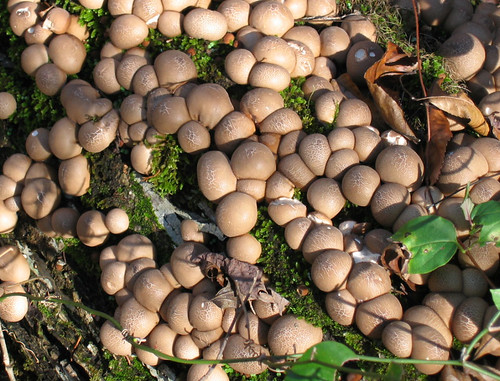
Lycoperdon pyriforme, Cedars of Lebanon, TN.
(*photo credit)
November 7, 2023 Shifting Diets for Environmental Improvement
Let's shift to greener diets for several reasons:
Personal health: We realize that average North Americans and Europeans have diets heavy in land-based animal products (meat, eggs, and especially cheese) -- in fact more than is recommended for good health. Lack of protein is detrimental to the health in poor areas; but so is excessive consumption of meat and animal products. Simply cutting in half animal product consumption would be healthy and it would be environmental by saving global resources. This is not pressure to become vegetarian, but a more practical effort to emphasize a total local diet emphasizing whole grains, vegetables, fruits, and nuts. Vegetarianism does not appeal to many, but a balanced diet could overcome obesity.
Resource conservation: We hear often that local farmers' markets and backyard gardening save the transportation costs of bringing exotic, non-seasonal or other foods from distant lands. Of greater impact is the saving resulting from shifting to lower resource foods such as whole grains. Consider that direct human consumption of grain is far more resourceful than to convert it to beef or pork and then food. Animal product production requires corn and other grains to be grown (using fertilizers), turned into animal feed (fossil fuel expenditure), then fed in animal lots (methane and other emissions) before processing, storage, shipping, and sales as meat products. Halving meat consumption would make a big difference. Studies, reported by Kajsa Lindqvist in Acid News, June 2014, shows great reductions in soymeal imports, forage grain on arable land, and use of grain as feed. In the EU 9.2 million hectares of intensely managed grassland and 14.5 million hectares of arable land (size of Romania) would revert to other purposes.
Environmental benefits: This shift in diet would reduce mineral nitrogen fertilizers by 30% (land used for cereal crops), and that means far less excess nitrogen contamination of nitrates in waterways and a 40% reduction in ammonia and other nitrogen emissions, thus improving areas of Europe with critical overloads of nitrogen in ecosystems. Maps reveal that a massive improvement in nitrogen balances would be possible by dietary shifts and that could also extend to North American practices as well. Levels of nitrogen efficiency in Europe would go from 22% to 41% under an energy crop scenario and to 47% for a cereal crop scenario.
Resource sharing: Reductions in livestock numbers would be helpful since the world is acquiring a taste for animal products. Asian and Latin American middle class seek to change their grain diets more to imitate the meat-eating class in richer lands. In fact, global animal products consumption is on a steep rise and this means more Greenhouse gases and accelerated climate change. Ultimately the poor are harmed by intensive resource diets and these poor folks need a minimal level of higher protein foods.
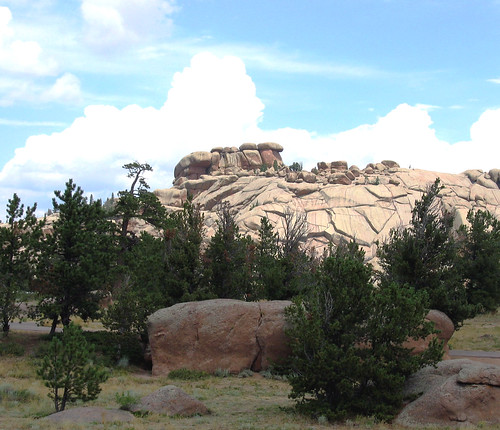
Vedauvoo formation, Wyoming.
(*photo credit)
November 8, 2023 Recalling the Fall of the Berlin Wall
After a third of a century, it is fitting to commemorate the fall of the Berlin Wall. That ugly symbol of oppression that divided Communist East from West Germany lasted for about four decades and did much to create massive tension for people wanting to cross over to the other side. In the attempt to escape Communist rule, some were shot and others caught and imprisoned. Certainly, an artificially divided German people were happy to see it fall. My only encounter with the Berlin Wall was when I had to return to the Youth Hostel in which I was staying in 1982 and could not remember the full name of the place, nor describe it well enough in my elementary German to get proper directions. Time was running out before closing hour and the streets were dark and I was near panic along the Berlin Wall -- what a vivid nightmare.
In 1989, crowbars and bare hands brought down the Berlin Wall, that awful symbol of division, and the atmosphere was one of euphoria and joy. The Cold War was coming to its finale and yet there was no fairy story ending. Eastern Germany has had a hard time assimilating and obtaining an equal economic and social footing with the western portion of a united Germany. Migration has been heavy from the East as people have sought better opportunities, and the East Germany authorities considered the "wall" as the last resort. Freedom cannot be withheld for long.
Can we not learn from history that Berlin Walls like the Great Wall of China and the Roman Empire frontier walls do not ultimately serve their intended purposes? The Chinese attempted to keep the Mongols out and this worked for only a period of time. The Romans tried to keep our own Germanic ancestors out of the rich and cultured Empire, and that worked for a certain period -- though when the Rhine froze one winter in the early fifth century A.D. the hoards crossed in large numbers. With time they entered, overpowered, conquered, and become assimilated. Does that say something about the Central American kids invading the U.S.?
Barriers are problem areas while they last. We find this in neighborhoods such as those in Ulster in Northern Ireland, where barriers between the Catholic and Protestant neighborhoods exist. Maybe we should learn from history that contrary to what our poet Robert Frost says about the domestic scene, walls do not make good neighbors -- they only hold people back from settling underlying neighborhood disputes and differences. Far better to tear down barriers and use diplomacy to resolve differences. A lack of historical perspective speaks to North America, Europe, and Australia about the hoards striving to come into these coveted lands. Barriers only work for a short while; greater stability in the exiting lands is of far greater importance. We certainly need migrant legislation and a viable guest program that discourages illegal entry or an expensive and forbidding barrier wall.
2023 Thanksgiving Appeal
EarthHealing is a non-profit environmental program that has been operating since 2000, working to save our wounded earth through books and daily reflections on our website, weekly social media essays and postings, and over 130 videos on YouTube. This organization has moved from the sponsorship of the Kentucky Jesuit Mission (which has suspended existence) to that of Al Fritsch’s original operation, Appalachia-Science in the Public Interest (ASPI). Through this process, the EarthHealing staff has held true, though cutting to half-salaries.
Al (whose cancer is now in remission) continues to create new weekly essays on current topics of interest and daily reflections at www.earthhealing.info, seen by folks in over 127 countries. Webmaster Janet Kalisz maintains the site and is responding to an increasing number of comments and requests on social media. A new series of YouTube interviews produced by Timi Reedy of ASPI and Mark Spencer will be out before the end of the year, and EarthHealing continues to explore the broad subject area covering environment. Our goal is to bring inspiration and insight on environmental issues, and help people become more aware of the importance of an ecological and more sustainable lifestyle, making the world a better place, too.
As our valued viewers, we are asking for your support. Our environmental projects require a lot of resources, and we rely on your generous contributions to sustain them. We are in need of substantial funding to make up for the monetary shortfall that came through Father Fritsch’s former pastoral work.
Please consider renewing your support for this program, needed now more than ever in our challenging world. Please send donation checks made out to ‘Earthhealing,’ c/o Mark Spencer, 241 Haiti Road, Berea, Kentucky 40403. As we continue to confront climate change, we appreciate any donation you can make to help us persevere with our vital mission.
Al Fritsch, SJ Janet Kalisz Mark Spencer
Donate by mail:
Earth Healing, Inc.
Attn: Mark Spencer
241 Haiti Rd.
Berea, KY 40403
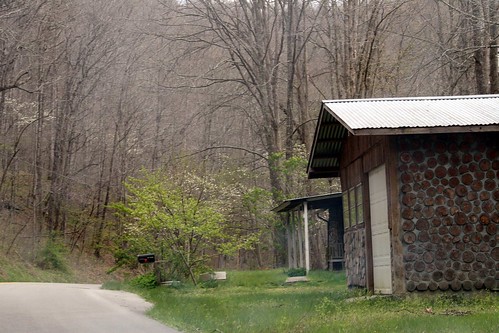
Cordwood dwelling, Appalachia-Science in the Public Interest.
(*photo credit)
November 9, 2023 Letting Go as Part of Life
November is a month when we recall letting go of summer ways, easy times and even the loved ones' life journeys. It seems that an important part of life as well as our sense of gratitude is based on admitting our grasp is mortal and will soon be gone. Riches are fleeting no matter how vast or supposedly well deserved. Fame will soon give way to "Who is that person?" Much becomes a fading memory. Many will soon find that their sense of power will give way to others with more power -- and on and on.
Part of letting go is a natural part of life. In the beginning we let go of the womb and come to the open world all around. In time we let go of crawling for walking and nursing for solid food; we let go of home for local schools and then for furthering education. Each is a hurtful movement but each gives way to new vistas. Life often includes letting go of home place or secure conditions to take on brave new worlds and career and marital status, each new step involving all too often the letting go of something quite comfortable -- and expanding horizons beckon.
Charity is a letting go practice. The loving deed often involves giving up one's independence or self-satisfying practices to serve others, to raise a family or to care for an injured or aging loved one. Through the process, we let go of precious possessions, even our own free space. Jesus tells us that the rich must let go of their wealth in order to enter the Kingdom of Heaven, a feat more rare than a camel passing through the eye of the needle. Astounded by the statement Peter asks who can be saved and Jesus replies that all is possible with God.
Saints are models for us to follow of those who let go. We have the age-old St. Anthony in the desert, who lived to be a century old and who focused his meditation on one Scripture passage -- this one of letting go of wealth for following the Lord. The more recently canonized St. Margaret Clitherow (1553-86) was married at age seventeen and a young mother at thirty-three when she was martyred. She was an outspoken critic of the Elizabethan reign in England, and was imprisoned three times. Her stepfather, the Lord Mayor of York, may have aided in her arrest, and made no effort to stop the trial and sentence of death, consisting of heavy weights on her body until she was dead. She died with great courage and willingness, even to letting go of her family.
We each have a certain challenge of letting go, whether rich or poor, powerful or powerless, in the eyes of the world or of ourselves. We leave the pampered children stage and loyalties for risks involved in each new successive stage of life. For the deceased who we specially recall in November, we find folks who have let go of mortal life at that "hour of death." They let go of us and we of them, though greater community togetherness is to come in eternal life.
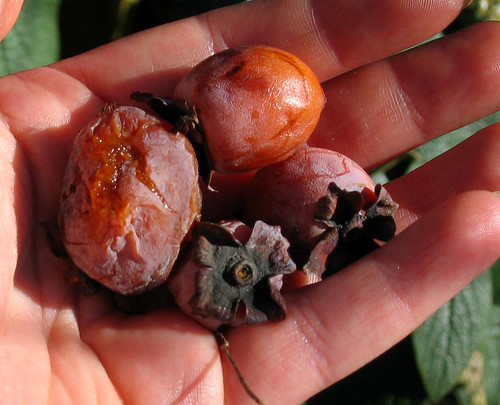
The joy of November's ripened persimmons in Kentucky.
(*photo credit)
November 10, 2023 Encouraging Christian/Moslem Mutual Respect
On Mohammed's birthday (in 570) we are reminded that his 1.8 billion Moslem followers are daily involved in making global news. Islamists and radical groups from Nigeria to western China make headlines, as has the Isis phenomenon in Iraq and Syria. The Middle East Spring of a decade ago has deepened into the autumn of discontent as civil war drags on with well over one hundred thousand deaths and the displacement of millions in Syria alone -- and Moslem factions are in the middle of each event. Attacks on Christians by Moslems occur in Nigeria, Uganda, Mali, Central African Republic, and other African countries along with conflicts in India, China and other nations with other religious groups.
Europe and North America are becoming more involved as Moslem immigrants arrive in larger numbers and some become radicalized by internal Isis-like groups. A difficult phenomenon involves hundreds of European and American Moslem volunteers in the brutal Syrian civil war, yielding to the possibility of radicalization and its aftereffects. Earlier this year more examples of Middle East converts to Christianity resulting in a backlash and murder of converts by radical Muslims. This is become more frequent in Iran and also in Nigeria where literally thousands of Christians have been martyred in this century.
Amid it all I have strived to gain a deeper respect for peaceful and law-abiding Moslems; this has been even more so after performing an environmental resource assessment of their West Virginia center near Charleston. I was invited and witnessed a prayer service and found that they pray with sincere and open hearts. Moslems, like Christians, come in many stripes and we must be aware of that. Sincere Moslems deserve our respect as do people of all faiths. We live in a world of two-way streets for we accept that Moslems can practice their faith freely in our nations, and so Christians of the Middle East ought to be able to live in peace as done for two thousand years; they must be allowed to practice their faith in open churches and public worship space. Respect must be a mutual endeavor. The age of military crusades is long gone and we have learned from history; we need to live in peace with each other.
Moslem/Western dialog must include the question of cultural differences, respect for the sensitivities of all parties, willingness to accept each other, and openness on the part of all nations to allowing the practice of the other's religion -- and this is especially true in Saudi Arabia where large numbers of Christian migrants come to work. They must be allowed to worship openly. Working towards mutual respect will certainly take time, but Christian love and mercy has the power to prevail provided bias and hatred does not creep in. Pope Francis has shown this on recent trips to the Middle East. Yes, we can all grow in tolerance together – and we must.
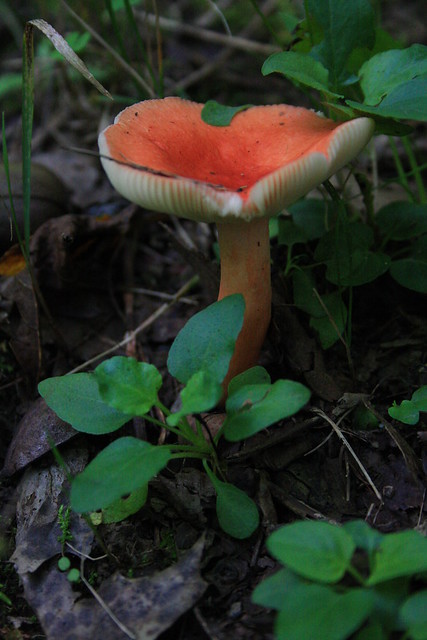
Fungi bring color to autumn forest floor.
(*photo credit)
November 11, 2023 Continuing Support for Veterans
Recently, we had funeral services for a local veteran of World War II and the Korean Conflict, A.I. Thomas. In every respect he was a well deserved and decorated ex-field commissioned officer in the U.S. Army -- and his family was quite proud. Many in the community did not know he was a hero. A.I. had led a detachment of soldiers to rescue several fallen comrades and some admitted they owed their lives to his unique bravery, but for that feat he received no Medal of Honor, nor did he want any. He called it more duty than anything.
On this Veteran's Day, after many within this century have sacrificed lives in the Middle East and yet the region is still is in utter disarray, we ask some basic questions: what is all that sacrifice about? Was it worth so many dying and being wounded? How do we ensure such bloody conflicts are avoided in the future? Our nation must answer practical policy questions and reflect on the propensity to prefer shooting rather than diplomatic endeavors. How do we treat those who return from that conflict or the Afghanistan struggle that ended two years ago? What do we say to relatives of service personnel, especially those who have made the supreme sacrifice?
Veterans have more than problems of justification. The hospital care of the wounded has involved long waits -- a major issue that is becoming resolved. Respect for sacrifice demands efficient caregiving along with answering the moral justification for the sacrifice: Does anyone really suffer or die in vain? A broader view of conflicts and the entrance of a people into defense of liberty makes this a highly worthwhile discussion.
Fresh from ordination during the Vietnam conflict I had ambivalence as to becoming an associate chaplain at Great Lakes Naval Base (1967-69). My dislike for war did not mean I would neglect offering help to the sailors and marines called to duty. My ambivalence is still present. I cannot refuse pastoral help, and yet I do not pretend to justify all instances of warfare, at least in the manner that combatants have justified it in their own lives. I honor their own justification, but what happens when that turns from justification to conscientious objection?
We are all collectively participants during conflicts and all are partly to blame for its continuation. Compassion means to suffer with another, and so with forgiving hearts we work together to prepare the world for coming glory. Even a surviving or wounded veteran and the family of those who were killed in the conflict can offer their meaningful suffering for the sake of all, friends and foes alike, so that the world can be healed and become a better place. The more open our hearts are to such sufferings, the more valuable our offering, for no one suffers or dies in vain. What can we add about the Russian/Ukrainian conflict?

Eastern box turtle, Terrapene carolina carolina, subspecies of hinge-shelled turtles.
(*photo credit)
November 12, 2023 Reliving the Joy of Coming Home
Today is the feast of the dedication of the mother of all churches in the west, St. John Lateran in Rome. It was built in 328 by the efforts of Emperor Constantine, and dedicated to Our Savior. Next to this church, the popes lived for a thousand years, and this ancient church was the location of five general councils of the Church. So, it holds a special place in our collective spiritual hearts as part of the Body of Christ that needs sacred space with a specific location -- not because God needs it, but because we believers do.
People seeking worship space are like homing pigeons with an instinct for going home, but people lack the instincts of the bird in their undertakings; we do not always know the way. However, we desire the security, protection, warmth, and love found in home life that is often elusive. "Home" brings back memories of past happy occasions when the domestic walls of a pleasant place in which we resided or visited exuded love and care. Favorite places are more than mere houses or domiciles; these exude hospitality and allow us to relax and take off our shoes and put our feet up.
A lot of sentimental songs have been written and sung about a home far away: My Ole Kentucky Home, Home on the Range, Home Sweet Home, and on and on. Something makes our heart skip when we think of such homes which bring back happy memories. We are home-focused and are oriented and get our bearings from located homes. Earth as home becomes our motherland, our womb and tomb, our object of respect. And Earth is shared with others who live here and seek a decent life as well. A sense of home needs to be extended to them -- for everyone is a stranger and guest.
Returning travelers and service personnel have a sense of pride on seeing the Statue of Liberty or an airport in the home country again, perhaps even becoming a little weepy. A homing "instinct" is a beckoning magnet within us that draws us back again to where we felt a sense of belonging with residual psychic energy and loyalty. The sense of being drawn back to a place of the past can be an emotional experience that is permanently fixed in us. That is why homecomings and family get-togethers are so important and so enjoyed by people who need to get back together.
However, no home we have experienced, no matter how warm and loving is totally satisfactory, because we are wayfarers. Our ultimate home is beyond the veil of this mortal life. Yes, we can open our lodgings as home to relatives and strangers, but that never totally satisfies us. We long for the face of God, a longing that is at the core of our restless quest. We will not cease our journey of faith because restlessness is in our bones. Simultaneously, we are at home, homeless, and always homeward bound -- for homes are defined in past, present, and future tenses. Let’s give special attention to the world’s homeless.
Hope in the Future
By Fr. Al Fritsch, SJ
Most of us have some understanding of a future: in what we do and say; some perhaps do not. The future is really a part of who we are and our existence, for existing today and expecting to exist even 5 minutes from now - this is the future. Some say they’re not interested in the future, they’re only looking to the present moment; I think that is not quite accurate. You really can’t do that, and when we say today we mean the whole day, including what’s ahead of us. Without fighting too much about it, the future does enter much into our lives, and there’s big uncertainty about it, making it all the more interesting to all of us. The future conjures mixed emotions: past questioning part, fearful part, the endless possibilities of what is not yet in view.
The future makes the present energetic and enthusiastic for Christians. We believe our future includes a new heaven and a new Earth. That means different things for different people, but for me it means that what we place upon the Earth, even the damaged and then repaired things, will be renewed; something greater is coming. And we, in making our future, create the world in which we are going to live. St Paul’s disciples may have thought this all the time - they also thought the future was going to come within most of their lifetimes. And yet 2000 years later we still are awaiting the future, and it always feels immanent, like it’s coming soon.
The future-less people really do not exist virtually; all of us believe that tomorrow is coming, for better or worse. Some may be afraid to think about what’s coming, but they also must understand that we participate in making that future. Facing it with an agnostic, unknowing concern is a lot less powerful than if we anticipate and prep ourselves for transformation. We are called to save the Earth. Now that is a very unusual thing because we say salvation is from Christ. Christ is the savior and redeems the Earth, but also there is Christ’s invitation to be part of His body, to take part in saving everything good in our Earth.
Saving our Earth means supporting renewable energy sources and green economy. We must replace the damaging fossil fuel economy. This is all part of being co-saviors, and as people helping in the salvation of the world we must look at it with a sense of hope. Hope is enthusiastic, hope is energetic, and it gives a different light to each of us. Therefore, the virtue of hope keeps us going and makes us more willing to participate in building that bright future.
We should pray about these matters, and first of all for the courage to hope. Hope is not something that just happens, it’s something that we cultivate and bring about as speakers for the future. We bring that hope to others and therefore convince ourselves in the process. We also encourage them to be more hopeful and to desire their own new future too, for it hurts the heart to work with people who have no sense of hope for tomorrow. Last of all we must pray for peace, for without it, we could not change a climate-threatened world. It can only be done with the peace that God gives and multiplies. Let’s remember that hope in the future is truly part of our trademark.
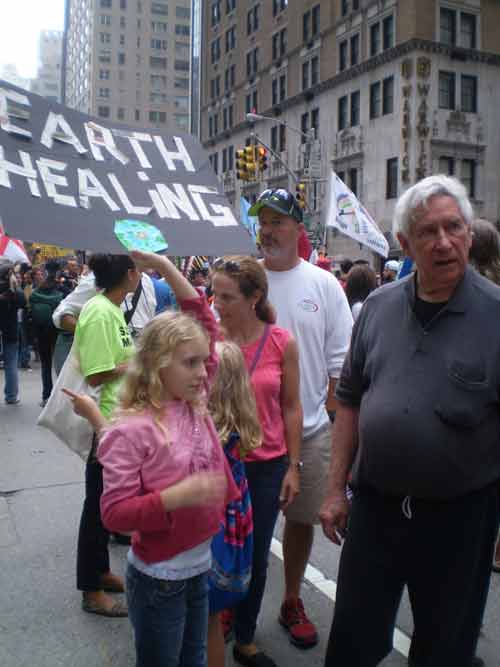
November 13, 2023 Puzzling Karen Silkwood Saga
I was deeply involved in a case five decades ago that remains unsolved. In 1974, a 28-year-old lab technician at the Kerr-McGee plutonium fuels production plant in Crescent, Oklahoma, died in what many regarded as a suspicious automobile accident. Karen Silkwood was on her way home after work and had been involved right before in criticizing her worker safety environment. In the eight days prior to her death her criticism had become most intense because she discovered plutonium contamination in her immediate workspace area and then it was discovered in her home environment. After her death, tissue analysis revealed some contamination within her body, most likely of recent origin. I knew how easily lab contamination can occur from working in chemical laboratory environments. And yet my loyalties were torn because of my respect for the union that Karen belonged to (the Oil, Chemical & Atomic Workers), for these generous folks gave us our first office space when three of us opened the Center for Science in the Public Interest in late 1970.
Unanswered questions from Karen's death persist: Was the Trooper who investigated the Silkwood accident correct in calling it a one-car-sleeping-driver accident? Was Karen's car struck from behind on that lonely Oklahoma Route 74, and, if not, why were there fresh dents in the back of her car? Had she taken or was she given the methaqualone to induce drowsiness that was found in her stomach? After certain legal struggles immediately following her death, why was the case headed back to court twelve years later and then settled out of court for $1.3 million? Why did the plant close a year after the accident? Why a few days before her death was contamination found on her arms and face and yet not in her locker or car? Had she ingested plutonium immediately prior to her death as the Atomic Energy Commission analyses suggested?
Such unanswered questions recede in our memory and get lost in the clutter of life. And sometimes they are retained and retriggered year after year at certain times and happenings. It is that way with the Silkwood Saga. Nothing truly made sense if she triggered the accidental events. On the other hand, why would the company have deliberately contaminated or harmed her? What we do know is that something dramatic happened and that it led to questions about worker safety in the nuclear processing industry.
In the ensuing forty years, numerous cases of worker health problems have surfaced that were not the result of mere haphazard accidents. Workers, especially in the Piketon Ohio areas of a process plant, have developed rare cancers and other diseases that can only be attributable to proximity to plutonium -- an extremely dangerous carcinogenic compound. We know we cannot treat worker safety issues in a cavalier manner. Questions about the Silkwood death remain unanswered, but the event is well worth remembering by all concerned with worker safety -- as well as all nuclear power issues, many of which are still unsolved to this day.

Queen Anne's lace, Daucus carota.
(*photo credit)
November 14, 2023 Discovering When Silence is a Sin
There are times and places in human history when we simply must not remain passive in the wake of impending disaster. We are presently at such a time and place, when fossil fuels are still be supported and applied. Yet the impending climate change is staring us in the face and the window of opportunity to act is closing. This time is similar to the period of slavery's defense vs. abolition at the start of the Civil War in the mid-nineteenth century. We must fish or cut bait. The climate change issue today is so very grave that many lack courage to look it directly and determine to do something about it. Is it fear to take on the issue? To engage with peer pressure? To act in a countercultural manner? Isn't NOW the time? Isn't HERE the place? Will the WE rise up and speak or be cowed into utter silence?
Looking to Jeremiah the prophet of old we find the similar but less grave conditions. The stones are speaking. Silence must be broken. Each concerned citizen who sees the closing window of time to halt devastating climate change is called to take a public stand. We attempt to do something meaningful and so proceed, however we can, with this reflection directed to a modest number of people and with some hope for positive results. We can speak with greater or less public attention; we may feel confident that we have done our part, but have we? Some would shrink from the moment and deny the situation, or say others should take on the task and through false humility excuse themselves, or they may attempt to escape to other allurements.
Denial is quite severe, as with an entire major political party with tens of millions of dollars supporting a spineless covey of legislators bent on doing the bidding of oil company billionaire tycoons. Excuse happens when proponents of decadence make social changes the issue of the day. Escape is when this perverse generation comes to see fiction as reality and reality as fiction -- because they lack courage to face truth. We are caught in a web of temptation and are desperate to exit the storm.
What is an effective voice at this urgent moment in history? Are we doing enough to write this plea right here and now, or does breaking silence mean more than verbalizing opposition to current conditions? We face the vast power of concentrated money being used to overcome any resistance such as mine or yours. It seems hopeless and one spoken word is prayer to God in whom we trust. We know that the mass media has a death grip on the public who exist in the crevices of the current System. This is precisely why silence must be broken with a thunder clap that awakens deniers, excusers, and escapees. Now is the time to act with utter determination, even to a point of civil disobedience if for no other reason than to show how serious the situation is. Furthermore, whether violent acts are necessary is questionable.
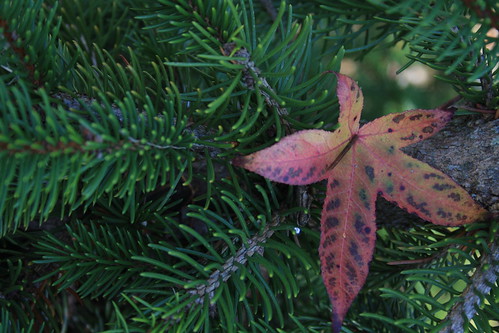
Vivid contrast of deciduous and evergreen foliage in autumn.
(*photo credit)
November 15, 2023 25 Years after El Salvador Jesuits Murdered
If they kill me I will rise in the Salvadoran People. Archbishop Romero
Some 34 years ago tomorrow, six Jesuits and two co-workers were murdered at the University of Central America (UCA) in El Salvador. The voices of these teachers had been a powerful message calling for change in a part of the world where inequality was rampant and a vicious civil war was in progress. In fact, for some time prior to the incident the faculty at the school had been warned that, if they did not stop speaking, something terrible would happen. They continued to speak through lectures, writings, and support -- and were all murdered in one fatal early morning darkness. They were Jesuit scholars and writers: Ignatio Ellacuria, Ignatio Martin-Baro', Segundo Montes, Juan Ramos Moreno, Amando Lopez, and Joaquin Lopez y Lopez along with coworkers Elba and daughter Celina Ramos.
These whose lives were so brutally shortened firmly believed in the Christian tradition that new life and radical change emerged among the poor and the marginalized throughout history, for it is among these that God is encountered. They knew that the poor constitute a privileged locus from where the Kingdom of God emerges in full bloom. The poor's blood is fertilizer, for that flowering that will undoubtedly occur in due time; this is already budding for those with the eyes of faith. The event of the Jesuit martyrs' deaths became a turning point in the Salvadoran Civil War.
The military that carried out this bloody task were all trained by officers educated in the School of the Americas now located in Georgia -- part of the American export of war-making expertise. Each year a faithful group of religious and social activists have gathered in Georgia to demonstrate for the closing of that school. To date there has been no success, but the gathering keeps alive the voice of the murdered Jesuits who spoke out so eloquently for social justice in Latin America and elsewhere. New ways of bringing about change are emerging.
Besides the anniversary, this is still a special year, since we are reminded that the problems in the poor world remain unsolved. Most are aware that over 60,000 young migrant people have steamed north in twelve months to cross the border into the United States, a major component of them from El Salvador and neighboring Central American republics. The poor conditions in their respective countries testify that the work the murdered Jesuits began is not finished. The poor conditions of El Salvador remain a challenge. In order to curb continued efforts at immigration to the U.S., our country must take extra steps in assisting the Central American and other nations of furnishing work opportunities for its eager citizens. We continue to strive for justice.
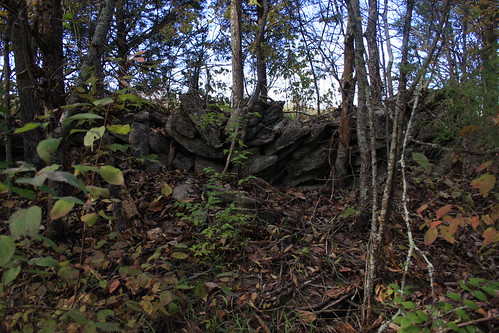
Handiwork of early Kentucky craftspersons. Stone fence, Mercer Co., KY.
(*photo credit)
November 16, 2023 Celebrating Chipmunks and "Ground Squirrels"
Some of our wildlife are very busy this November. Some of the rustling about is due to what we call the eastern chipmunk (Tamias striatus) "ground squirrels." Further west, the other related species of rodents are known as Richardson's ground squirrels or gophers or American marmots. By the time one reaches the Great Plains there are prairie dogs and a variety of burrowing and excavating creatures such as marmots that are sub-distinguished -- and west of the Rockies there are still more. But the eastern chipmunk is brown with light and dark stripes and is admired.
Friend or foe? I always regard this chipmunk as cute and worthy of close observation. Their chirp, especially when startled, is a delight. Besides the sheer beauty and entertainment that these rather ubiquitous creatures give us every day, they do serve some specific functions. The little varmints bury nuts and seeds that can sprout from their complex tunnel networks and become the trees of tomorrow, when it is particularly difficult for some of these to be buried far enough below the surface to sprout and grow. Some folks make pets of them and help them live beyond their normal life span of three years (to upwards of five additional ones in captivity). Others unfortunately regard these creatures as a food source for mammals, raptors, snakes, and for household pets.
Pests? Some call these little omnivores "nuisances," since they will eat just about everything, from grains, seeds, berries (blackberries and raspberries) and mushrooms to insects, bird eggs and salamanders. Extensive literature is available on how to trap, kill, or move them to other locations. However, many of us are against transferal to new locations, for, after being moved the little varmint is more susceptible to being preyed upon or spreading disease. Yes, they can get into flowerbeds and gardens and look for bulbs and seeds. A while back I blamed these culprits for uprooting my small American chestnut saplings to extract the remainder of the chestnut. Yes, proximity to the National Forest makes one more tolerant of surrounding wildlife.
Hibernation? We observe chipmunks on many of our warming winter days and wonder whether these varmints even hibernate. Maybe their food sources are scattered and not in one tunnel complex. Maybe they think it is spring come early. And maybe they are like some of us and only temporary restless sleepers. Certainly we hear them rustling leaves when they make their quick movements about in the wooded areas or in protective underbrush. In fact, in the non-growing months it is good to observe the lively ground squirrel, the insomniacs of the woods. I doubt whether these little rascals will ever be given full protection, but they deserve our respect and celebration. They may not be harbingers of spring, but they make late autumn life a delight.
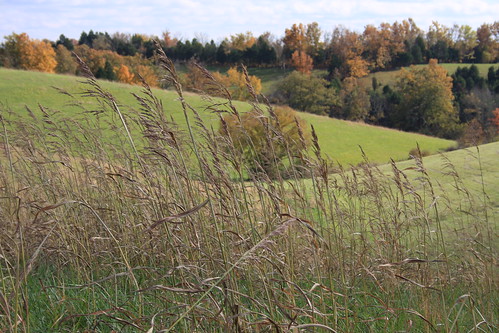
Swaying grass in November field.
(*photo credit)
November 17, 2023 Observing American Education Week
Education is the gateway to a better quality of life, and so all citizens whether young or old ought to become deeply concerned about the educational climate of our local community, nation, and world. Fast developments in technology, increasing costs in higher education, and deterioration of discipline and security at some places make issues more pressing than in times past. As activists we should press for various educational issues and improvements:
* Review morals and values being presented at public as well as private schools;
* Focus on safety and discipline on route to and at particular schools, how well students and teachers are protected, and fair discipline rather than zero tolerance policies;
* Forbid use of illegal substances by those at or near the school vicinities as well as banning e-cigarettes from campuses (which tend to damage no-smoking policies);
* Provide normal auxiliary services (laboratory facilities, music, art, computer technology, guidance, and counseling) in districts that have financial problems;
* Extend school lunch and nutrition programs even during vacation periods;
* Remove junk food from campuses and require healthy menu policies;
* Address bullying or unfair peer pressure, especially with reference to dress codes;
* Promote the value of magnet or other special advancement or placement facilities in a total system with poor practices;
* Attend to over-stress' on certain extracurricular activities and especially sports programs;
* Challenge excessive testing and rating by the state or other groups that place too heavy a stress on achieving schools or students;
* Celebrate the presence of mixed racial or cultural groups and the relations and harmony in the entire school body;
* Look into those with special needs, either with difficulties in studies or who are ahead and deserve advanced studies programs;
* Encourage parents to participate in school policy-making, especially at the lower school levels;
* Pressure legislators to extend free education both for pre-school age young people and for those past high school in the junior college levels (now being initiated in some states);
* Address financial issues related to adequate teacher pay and the type of equipment and physical facilities, as well as forgiveness of student loans that tend to overly burden graduates for years, especially for those who participate in community service or have lower paying jobs.

Remembering an early autumn aster.
(*photo credit)
November 18, 2023 Finding Faith on Earth
When He Returns Will He Find Faith on Earth? (Luke 18:8)
Of all Scripture phrases this haunts me most,
for I sometimes doubt my faith-seeking boast,
that we advent people await his coming,
and excite others through constant drumming.
Will he find us steady at the end of time,
expecting him, no passing paradigm,
but rather in bold wind salutes, not fear,
trusting a new creation soon to appear?
His question echoes now in our praying,
challenging our hesitant soothsaying,
seeking success in what's already done,
and hoping that today goes on and on.
Do steely eyes burn with fundamental light,
haters of all worship, not theirs, so right?
Are we ritually correct to openly yearn,
and learn to really await his return?
Upon return will he find faith on Earth?
Will we be helpful in planetary rebirth
to this wounded and fragile troubled land,
fresh and waiting upon the Son of Man?

Groundsquirrel, preparing for winter.
(*Photo by V. DeLoach, Creative Commons)
November 19, 2023 Utilizing Our Talents and Opportunities
Concerning times and seasons, brothers and sisters, you have no need for
anything to be written to you. For you yourselves know very well that
the day of the Lord will come like a thief at night. (Thessalonians 5: 1-2)
St. Paul reminds us to be always observant and on watch, because we are travelers in dangerous areas. In all respects our culture would prefer t ha t we would attend only to material concerns and goals, to expend time on worldly things, and to waste talents that could be of service to others. On the other hand, we are not to burn our talents on the security of material investments, but to use them well and at some risk while being of service. (See Matthew 25:14-30). Wisdom is knowing the shortness of life and the talents given to be used during this short span. We have both fleeting time and limited talents and the proper use takes grace; openness to God's will is quite imperative. Strike while the iron is hot.
Perhaps we take our talents, (physical, emotional, spiritual, or mental) for granted. On the other hand, we may invest them creatively according to time and circumstances. The opportune time to act is before us. The successful materialist knows how to invest at the precise moment and where to focus monetary attention. In a spiritual way we are to do the same. We must see needs at our doorstep when the poor cry out for comfort through both spiritual and corporal works, and we are to answer them with compassion. Someone out there needs us, at least in simple ways.
Burying our talents or wasting precious time is not allowing them to benefit others -- and at times we would like to shake a lazy person or one consumed with material cares and say "Your life is fleeting before you. Seize the opportunity now!" We certainly ought to do this when others could use our encouragement but not our badgering. Burying talents happens when people deny a calling, excuse themselves from personal responsibilities, or escape to drugs or other allurements. Truly, doing something creative with talents involves a risk: we might have to face harsh reality; we may fail in trying; we may discover that using our talents takes an enormous commitment of time and energy. And we must be aware that no matter how hard we try, the service may not yield apparent good immediately.
The balance is central to spiritual success. We cannot waste the opportunities given nor the talents that we have. Pretending a new opportune time will come later damages the present through postponement; pretending we do not have talent to share now is false humility. The key to spiritual success is to sense that time is precious and slipping away, and that we have our talent to offer as service for others right now. Our window of opportunity is relatively short, no matter how long our remaining lifetime. Using talent well is a grace in itself; so let's pray for it.
Renewable Energy Today
By Fr. Al Fritsch, SJ
For folks who are in need of some good news, we can say that renewable energy is on track to replacing fossil fuels (oil petroleum, natural gas and coal). However, in some ways this may be a mixed blessing. Renewable energy (energy that replenishes faster than it is consumed) is expanding rapidly with solar and wind at the forefront, but also hydropower, bioenergy, geothermal and ocean technologies forming an exciting energy generating alternative.
Coal consumption is going down fast, especially in the United States and other progressive countries, and within three years solar will be of greater importance than coal in electrical generating capacity. With wind it’s currently 7% of that capacity in the United States, and that number only includes utilities. If you apply the increasing number of home solar installations, it could be 10% of our total electric generating capacity. Remember that at the turn of the century it was almost nothing, and this all happened in the last few years - growing at a very rapid rate.
We can say that’s a problem or that’s a point for the United States, but it also applies to a number of other countries attempting to enter into a renewable energy economy. According to the International Energy Agency (IEA), renewable capacity will meet 35% of global power generation by 2025. This rapidly growing phase of renewables is good, and we hope it continues fast enough to avert an up and coming climate catastrophe. According to an ongoing temperature analysis led by NASA’s Goddard Institute for Space Studies (GISS), the average global temperature on Earth has increased by at least 1.1° Celsius since 1880. Remember that we had the hottest July ever recorded this year, and we question whether renewables will be enough.
When we say that the renewable energy picture is mixed, we really mean that because places like India and other countries which are behind the United States and Western Europe in their use of individual cars, electronic devices, and especially air conditioning, energy demand will increase at a very rapid rate. Will the growth of renewable energy match the increase of energy demand in these countries, who may find cheaper fossil fuels (especially coal) desirable?
This mixed energy outlook can only be balanced if we try to further reduce our own energy usage, and encourage other countries to pace themselves as well. We can hardly expect them to practice an austerity that we ourselves have struggled against, and the energy picture becomes more complicated. The problem is the replacement of the fossil fuels is not occurring fast enough, and the 2030s is going to be a critical time. Let’s hope that we continue to become more energy aware and invest in renewable energy - and divest from the use of fossil fuels which are still receiving a lot of support. All in all, we have to change, but we have to move at a deliberate and fast speed in order to keep the world from catastrophe in climate change.
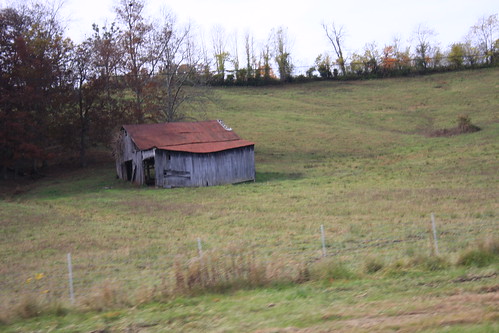
Simple barn of rural Kentucky farmer. Rockcastle Co., KY.
(*photo credit)
November 20, 2023 Viewing Barns as Symbolic
Far more people are fascinated by barns than just those who grew up playing, working, and spending time in these distinctive farm structures with their warm feelings. Travelers note that barns punctuate the countryside with a certain rustic beauty that enhances the total environment. And we judge a community's economic health by the conditions of its barns. Even the ethnic composition of earlier settlers can be surmised by the unique architecture of barns with designs carried over from the old country. Furthermore, the manner in which these structures are constructed show the economic history of the area (what commodities were grown and stored in them). Barns manifest a record of those who designed, built, and maintained them well, but abandoned them.
Youngsters are drawn to barns, for they are worth exploring, and they stretch the imagination by their presence and inviting atmosphere. Honestly, the fascination deepens with years, for there is so much cultural history in the shape, location, and condition of barns -- their size, materials, foundations and placement. In reading about ethnic settlements and the cultural ways brought by settlers, one sees that some barns reveal a complex history of place of origin. There are Germanic, Polish, Czech, Amish, Ozark, Bluegrass, Appalachian, and Scandinavian barns, tobacco barns and livestock barns, storage and drying barns. Some are close to one's house and others removed. Some are great for homecomings, dances, worship, and social events; others are multi-tiered, allowing equipment, hay, and grain storage above and livestock stalls and pens below. Others include silos and adjunct structures as integral parts of a total farming operation.
A tour within the structures gives us even more insight into the manner and materials used by builders in constructing these buildings. Our large now destroyed barn at home was 120 feet by 60 feet and was built for hanging tobacco plus storing hay and equipment, as well as providing pens and stalls for livestock and a milking parlor. That barn was built about 1900 in a post-and-beam style with 12 by 12-inch red oak framing timbers about 30 feet tall in the center posts. And when new owners tore it down it made one of my brothers cry – a heritage had been lost. In inspecting older barns of the 19th century, one finds this gold mine of older heavy timbers of oak or poplar wood.
Many of the lesser well-built barns have fallen into disrepair and perhaps half of those in America are gradually disintegrating for lack of funds or proper maintenance. The condition of America's barns is pathetic to say the least. Only a minority have the white, red, black or gray painting that characterized the barns when I grew up during the Second World War. Disrepair depresses communities, no matter how well homes are kept. Barns give character to communities; recall that Christ was born in a stable.

"Sun dog" around mid-day November sun.
(*photo credit)
November 21, 2023 Weighing Climate Change Issues
Virtually all of the world's scientists believe that human activities cause climate changes now being recorded in ever increasing ways: glaciers recede and a major ice sheet breaks loose from Antarctica; permafrost in the polar region melts, oceans warm and rise about four mm. per year; coral reefs erode and wildlife habitats change; the hottest years in the past two centuries have occurred since 2000; global carbon dioxide levels exceeding 400 ppm have occurred for the first time in tens of thousands of years, and increased frequency of extreme weather events are noted. When the Larson B shelf collapsed into the Wendell Sea adjacent to West Antarctica in 2002, it caused the glaciers behind it to move at six to eight times the rate of a mere two years previously. Whole sections threaten to break.
With this series of phenomena, the temptation is to look for other impending conditions and to create media events. What about a possible shutdown of the Gulf Stream? Currently the stream warms western and northern Europe by about 20 degrees over comparable latitudes in Canada. The Thermohaline Circulation pulls in warm salty tropical water and when this water cools it sinks and draws down colder Arctic water and brings in still more tropical water. Excess fresh water from the Greenland icecap could weaken the stream's saltiness, and this seems to have started happening in the last few years. Some scientists say it is too early to tell, but others predict the stream will stop flowing within two centuries.
A major puzzle that has not yet been solved is the effect not only of increased levels of carbon dioxide as mentioned, but also feedback loops that would allow release of far more greenhouse gas- potent methane now locked in the colder regions of the globe. Even the so-called cleaner switching to natural gas by the fracking extraction of fossil fuels is not an advantage if leakage rates in processing are above several percent of fuel obtained. In fact, determining leakage amounts has proved quite tricky; it is possible that the methane advantage simply does not exist and the switch from coal to natural gas has not reduced the inevitable march to climate change.
No doubt media stories tend to be dramatic, but prudence tells the observant and knowledgeable that something is happening and some changes may be irreversible if allowed to continue. All the while, the scary possibilities do not always translate into personal or institutional policy changes. After all the climate change hype the carbon dioxide levels in this country still rise a small amount with continued use of fossil fuels. Renewables are increase and gaining one percent of total energy capacity and use right now, but we should also consider reduced and efficient use in the immediate future. Part of the problem is that this generation will not be here when big climate change effects occur. However, we must consider the well-being of the next generation after we are gone. It is what each generation is called to do.
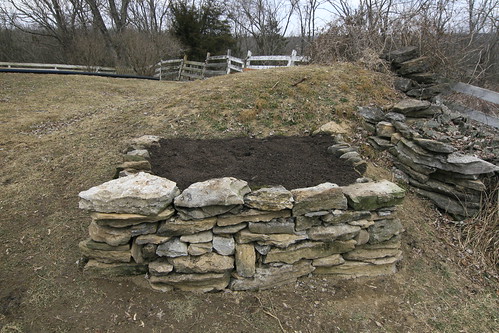
Preparing garden beds for spring.
(*photo credit)
November 22, 2023 Considering National Stop the Violence Day
Today, 60 years ago, John F. Kennedy was shot and killed, a day many of us will never forget. For several decades this day has been dedicated to stopping violence in all its forms. We Americans live in a constant atmosphere of violence with horrible TV pictures of overseas violence, with monthly mass violence somewhere in the U.S., and with daily gun episodes near and far. Look what people are doing to their brothers and sisters! America was conceived in the violence of the Revolutionary War after the violence of settlement and displacement of Native Americans. Recall that the first "formal" thanksgiving feast by those celebrated Pilgrims involved the merciless liquidation of the Pequot tribe in the 1630s. Unfortunately, violence and a "right" to bear private arms has become part of the American psyche, one leading to the other.
Curb domestic violence. Controlling anger is a perennial issue. Though we know righteous anger is needed at times, still lack of control leads to violent behavior that makes us aware of the demons within. Self-control is needed. Our homes witness violence creeping in via TV and Internet. Some of the most violent neighbors have a weapons' cache, are plotting ways of expressing their violence, lose control of themselves, watch the wrong social media, and fill their minds with anticipated violent actions to self or others. This adds to high levels of stress on the part of 115,000,000 Americans and its after effects (See GUNS downloadable from Brassica Books). Less access to weapons, illegal substances, even prescription and over-the-counter drugs, and less pressure within our society could curb domestic violence
Learn to curb violence nationally. As a nation we have been a country of the frontier, pioneer, anti-colonial, Yankee, and military spirit -- and unfortunately this spirit predominates to a degree that this superpower can, without really trying, become the bully of the world. Americans may be maturing, but we still have childish ways; our cowboys or urban warriors are not noted for being non-violent, especially if the Second Amendment continues to be interpreted as personal rights to automatic arms. What insanity! Non-violent behavior must be part of national policy.
Violence abroad must be recognized and countered. Our foreign policies have been replete with examples of American violence spreading out from home and town to beyond our borders. The Monroe Doctrine was meant to reduce violent interference and yet we have somehow colonized the western Hemisphere and hold on by subverting governments and training thugs in civil warfare. In early times the U.S. showed restraint in entering into Napoleonic and First and Second World War struggles; we did fight after hesitancy. Restraint was forgotten in conquering Native American tribes, in the Mexican and Spanish wars, in Vietnam, and in the Gulf Wars. It is time to take a deep breath and start on the road to peace lasting non-violence.
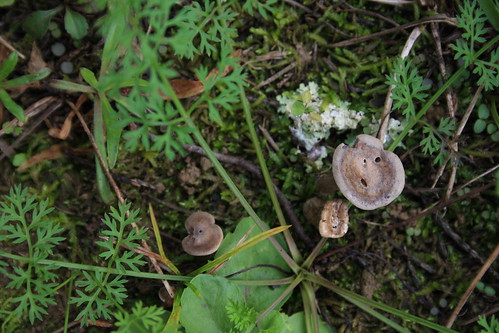
An assortment of fungi provide color on the autumn forest floor.
(*photo credit)
November 23, 2023 Thanksgiving Day: Thanks Lord for Simple Things
Alarm clocks
Audiences who are respectful
Bird songs
Bells and more bells
Cedar trees
Cherry pie
Decorations at graves
December
Egg rolls
Embers glowing in the dark
Fig bars
Frosty morns
Guardian angels
Google
Healthy organs
Hospital signs
Insulation
Iced drinks
Juniper berries
Jumping cables
King snakes
Kitchen cleaners
Libraries
Lamp posts
My bed
Moms-and-Pops' diners
Nice waiters and waitresses
Napkins
Old timers with sound minds
Oatmeal
Pollution controls
Paper weights
Quaint folks
Quinces
Rest stops
Road maps
Smooth Highways
Seat belts
Turtles
Traffic cops
Utensils for cooking
U Turns
Valleys and hills
Volume adjusters
Winding creeks
Wind chimes
X-ray equipment
Expectations for tomorrow
Youth
Yuletide
Zealous teachers
Zees
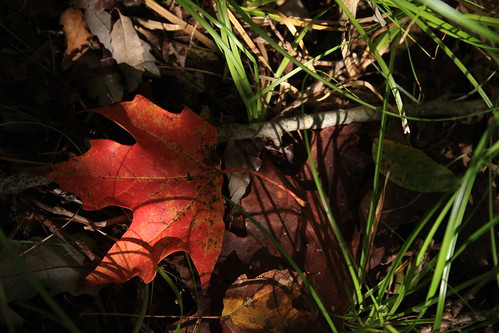
Joy in collecting autumn leaves.
(*photo credit)
November 24, 2023 Buying Nothing Day
Today is the largest shopping day of the year in the frenzy that initiates the holiday buying spree. But let's consider that this is really, not a fitting close to a sincere offering to God of thanks for all the good gifts we have received. It is almost a taunt at the Giver of spiritual gifts and a temptation to forget our humble and grateful posture on Thanksgiving Day. Some would urge us to return to the practice of becoming consummate consumers even before working off the turkey and dressing.
One response to temptation is to deny that buying is a patriotic act that holds up our economy and keeps people in jobs. Rather, let us accept a policy of trying to limit those 24-7 establishments to more reasonable hours so as to allow staff and management time for well-deserved rest, which is what "Blue Laws" were all about in the first place. I try not to make purchases on Sundays as well, since these were meant to be days of rest for the serfs, slaves and servants -- one workless day a week and certainly meant for everyone, not just the privileged.
As members of our hurried and busy world, we need to pause, rest, and reflect; and the day after the Thanksgiving feast is the most opportune time to do just that. Put up your feet, talk to guests, snooze, stroll, watch the games on television, see a movie rented earlier, do some productive art, write a reflection, or chat with those around you. Just don't make purchases. And get a few others to do the same thing. Who knows, if enough people observe Buying Nothing Day, the store managers in the malls and even on the Internet might call a truce and give employees a longer holiday.
The best self-control this day can generate is putting off going to the corner store and refraining for one day from making the smallest purchase. Try it for just one day, please. Observe self-restraint in allaying the consumer spending impulse -- and get all those around -- family and friends -- to do the same. It may be the ideal time to engage folks in seeing why we must control our consumer urges. Remember, America is the most consuming culture the world has ever known, and this planet cannot afford more like us (though China is close behind). Observe the amount of material we consume and the impacts this has on the rest of Earth, on climate and on accumulated waste materials. Help all raise environmental consciousness for this urgently needs to be done now.
This day of non-purchase during the Thanksgiving holidays is hard to observe for travelers away from home and in need of another tank of fuel. Buy gasoline for shorter trips the day before, or carry a packed lunch to refrain from the fast foods or dinner trip. Beyond that it is difficult, because emergencies may arise or distances must be traversed. But ninety percent of Americans will not travel great distances in the middle of the holiday weekend; yes, be patriotic and don’t buy today.
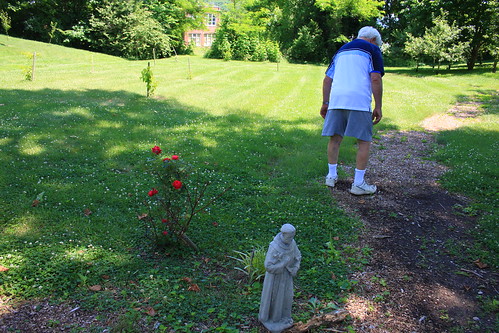
Fr. Al taking a leisurely walk in the gardens at St. Elizabeth of Ravenna Church.
(*photo credit)
November 25, 2023 Walking as Good Daily Exercise
For over four decades I jogged for daily exercise and still regard this as an excellent inexpensive way to keep healthy. In fact, once an exercise becomes part of the daily routine it is easier to find the energy and time on difficult days to get outdoors for fresh air and full-spectrum sunlight. Having said this, there is an even better candidate for a number of reasons, namely, walking. Here are some reasons:
* Moderation -- Walks are not overly exerting as are jogging bouts that can harm the knees or back. It can be chosen according to amount of time expended, distance, and period of the day;
* Safety issues -- Walks (when we are properly protected) are less dangerous in snowy or rainy weather than is jogging, with the possibility of more easily slipping or misplacing a step;
* Ongoing Health -- Walks give the daily constitutional without extraordinary exertion of energy, especially in hot weather. One can set the limits and restrict activities when knowing it will be too hot or cold, always realizing that walking can gently increase heart rate and inspire a good outlook on life;
* Sightseeing -- Walks when done briskly can cover a surprisingly long span of road because they do not require the rest stops of jogging. One can get in as many steps walking as in jogging in a one-hour period -- though the total distance covered is less; on the other hand, one sees much more of the countryside by walking and can admire the glory of creation in a deeper manner;
* Less stress -- Walking lacks any competitive stress or dreams of greatness. In fact, walking can be briskly done or a slow stroll that may not be an exciting exercise but still a good thing. One can pick up the pace, swing arms, choose a more congenial pathway, or wear more clothes to increase perspiration;
* Economic -- You can walk without expensive jogging shoes or other equipment and still be a well outfitted walker;
* One of several exercises -- Walking can be an option if one has another indoor alternative practice, for this allows all season exercising even in unseasonable times;
* Neighborliness -- Walking invites neighbors to converse, whereas a jogging pace makes them think they will disturb you if they do more than wave hello. Yes, when you walk, folks are more willing to talk; and
* Spiritual reflection -- This can be precious time to get away from familiar scenes of ordinary busyness. We need breaks.
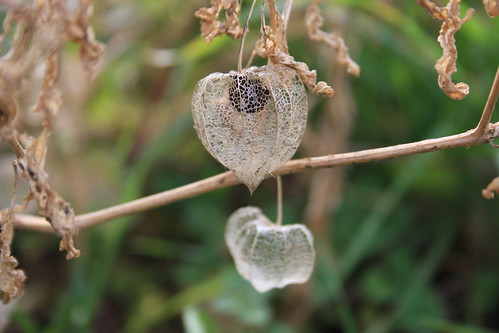
Ground cherry, Physalis heterophylla, edible native Appalachian plant.
(*photo credit)
November 26, 2023 Proclaiming Christ as Judge
For I was hungry and you gave me food. (Matthew 25:35)
These words are music to the ears of those who make a life commitment to serve others. Jesus, as King, invites into his Kingdom all who give food, drink, lodging, and clothes to other fellow human beings and who practice the corporal and spiritual works of mercy. People who see the needy, but do nothing for them, retard the establishment of the kingdom and will hear more unpleasant words from the judge.
We receive this judgment either as individuals or as communities. In an individual examination of conscience, we can ask ourselves about our own insensitivity to others due to a self-centered focus and the quest for comfort. Do we forget those who are in dire need because we are taken up with wants that we deceive ourselves into thinking are legitimate needs? Others suffer dramatic needs through weather extremes (earthquakes or hurricanes), or from such recent struggles as the Ukrainian/Russian conflict tor those forced to live in Gaza Strip conditions or in migrant camps. However, we do have the hidden and silent poor within reach of our local residences, if we take the time to look. Truly, the poor are among us.
The King addresses all those with levels of affluence in all parts of the world -- all must address a litany of unnecessary wants and become sensitive to the poor or we will lose our individual soul or collective faith. Material affluence can overwhelm either actual possessors or those striving to become so. Actions that are insensitive and self-centered lack compassion and a radical desire to share with others, a mandate that involves salvation of individuals and our nation. A competitive culture must give way to a cooperative one. To paraphrase Lincoln, we cannot continue in a world half slave and half free, half of haves and half of have-nots. Insecurity abounds. In order to cope with inequality, Americans maintain an expensive military machine to protect those resources required to keep affluence secure. Is climate change an indicator of inordinate selfishness?
Christ is our King. If we invite Christ to lead us, we will be able to respond by helping to establish his Kingdom here and now. If we honor Christ above all as Lord of the universe, we will restore a sense of respect within our world and enthusiasm for the mighty works that need to be done in these troubled times. Our church year is now coming to a close and we prepare for the new one next week, so let's do some soul searching. Should we continue to entertain our individual selfish allurements? Should we as citizens ask questions about the conditions of people in other parts of the world who are in need? Should we resolve to address climate change with renewable energy resources and conservation measures? Should we reform our immigration policies and do so now?
Keeping Emotional Balance
By Fr. Al Fritsch, SJ
This treatise is not directed to those one-quarter of people who have mental illness or problems. Rather, we’re looking at the average person who still has to have a certain emotional balance in how they think and act during the normal ups and downs of emotional life. What follows are merely suggestions, and you may have many of your own, but here are some examples that will help keep that balance so needed in our everyday ordinary life.
Express your emotions in appropriate ways. Don’t let quarrelsome issues fester, which wears us down with sadness, frustration, or anger. Try to address or change those issues so we can move on and interact with others from a fresh place. Observe your emotions and reactions relating to local physical conditions, such as during drops in air pressure or cloudy days, and never make critical judgments at times when you are low. Give yourself time to think and calm down before saying or doing something you might regret.
Take good care of your physical health to keep it from affecting your emotional health. Regular exercise, balanced meals and good sleep are all important, as well as ample time outdoors for full spectrum sunlight (especially in winter). We all occasionally experience health problems and they can get us down. It’s important to recognize the difference between physical and emotional suffering, and see that good appetite, rest, and medicine all have to work together to create a healthy state.
Maintain a spiritual conversation with the Lord. Some people feel very distant from God and therefore never connect, but we should just talk to the Lord in our own way. Many times this gives us the balance that we need to continue in our everyday life. We can also help others by remaining aware of the issues that affect them. Sometimes a change of subject, venue or mood can lift another’s spirit and keep all from being mired.
Focus on what’s important to you in life and try to find a healthy balance between family, friends and work, and other activities that are meaningful to you. Take time for things you enjoy. Sometimes a hobby or a break gives us the freedom to truly appreciate life. Related to this is to take rest when needed. It’s essential to find methods to help us manage stress, even if we just close our eyes and remain still for a time with deep breathing or meditation.
Stay positive and surround yourself with happy, healthy people. Some have a gift for this and a knack for an upbeat attitude. Positivity is infectious and can help us focus on the good things in our life. On the other hand, we must turn away from negative outlooks and subjects that get us down, and yet release and process our own painful emotions. It’s critical to check in with ourselves each day and at times, cut ourselves some slack.
While avoiding negativity and practicing self-care, we must also be able to recognize actual mental illness that may require professional help, counseling, or medicines. It’s said that for some issues, treatment could take up to 11 years from the time it was first noted. So we should think about how we may assist and alert others in their own health journeys.
Lastly, we can learn and strive to be cheerful and create positive outlooks, to interact with a sense of optimism, even when it’s hard for us to do so. This attitude and deliberate efforts can actually make us more cheerful, and create emotional balance to live a better life.
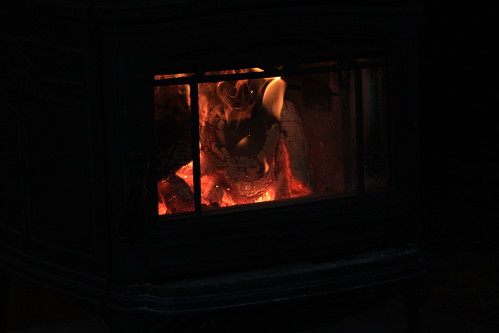
The gift of a warm fireplace.
(*photo credit)
November 27, 2023 Championing and Promoting Natural Capital
Hidden environmental benefits occur all around us, though most have never been assigned a monetary value. I realize that our national forest, natural bridge, and Red River Gorge have more than tourist value; they are truly environmental assets and "national capital." Ecological economists estimate that the forested sections of northern Canada and Russia contribute some $250 billion annually in value to the planet through absorbing carbon, purifying water and providing other ecological benefits that may include modifying climate conditions, harboring wildlife, and controlling pests. All of us recognize such values, but we are skeptical as to how any such economic numbers can be determined. Certainly "natural capital" may be acknowledged even by some of us who are not admirers of capitalism, but we need not worry: few capitalistic economists include this phenomenon in their current calculations.
Certainly, natural capital estimates may be somewhat loose approximates, but their value cannot be omitted when discussing the environment in which we live and make decisions. We have accepted estimates that in forested Maine and other states hundreds of millions of dollars worth of damage has been done annually through operation of off-road vehicles in cross country exploits. We champion a tourism that necessitates inclusion of scenic value of untouched forestlands as a component of any assessment of natural worth -- not just the price of the timber that can be bought and sold. Climate change advocates reach out for damage estimates in reckoning cost/benefit analyses; air pollution health effects include human life AND wildlife value.
The trouble is that we live in a world that judges in dollars and cents what is gained or lost by individuals or corporations through purchase, sale, and tax assessment purposes. Market exchange becomes the sole arbiter of value and that makes the broader environmental discussion more labored; this oversight limits discussion and environment is always short changed because it would quickly change choices of what to extract or leave in the ground. Calculations based on the cost of damage repair must include the cost of occupying and damaging natural protection zones such as wetlands that ought to be left intact. By failing to include nature's assets developers have a freer hand in damaging the environmental natural capital. Putting dollar values on such natural assets is an approximation, but so are almost all economic calculations. In fact, values extend beyond the market world of dollars, but are still valid when placed for comparative judgment.
Don't get drawn into the trap of omitting natural capital value and be at the mercy of savvy traditional economists. Common sense, artistic appreciation, and a sense of eco-justice perceive values beyond marketplaces, with their failure to calculate environmental costs and do so without remorse. Natural capital exists and must be inserted into development considerations.
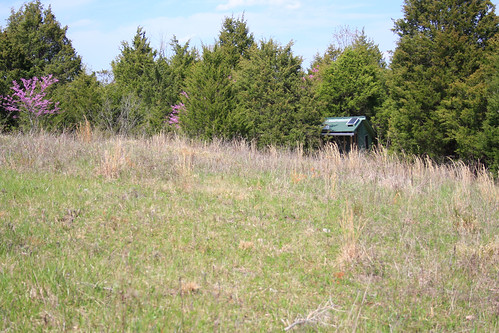
Solar shingles to provide for small-scale power needs.
(*photo credit)
November 28, 2023 Promoting Solar PV Shingles and Panels
Renewable solar energy is replacing wind power as the fastest grown energy source; materials are now relatively cheaper, technicians are available, regulations are becoming more favorable, and people are coming to appreciate the clean source. Solar energy promises to be the renewable energy of the future as more governmental tax breaks shift to renewables in an effort to save off the catastrophic conditions of acute climate change.
Solar sources are both larger scale solar farms and also the single units found on an increasing number of homes and offices. Both types are subject to changes that are more efficient. one application emerges as extremely promising, namely, low-cost shingles for building roofs that can serve the same function as a typical solar photovoltaic array. Development has been in the offing when more highly efficient (ranging from 15 to 30%) silicon cells constantly enter the market. Solar shingles and solar roof panels become a more integral part of the structure and thus enhance real estate property value; they cover enough territory to offer in-house electric requirements, with surplus returning to the grid, especially on hot days with air-conditioning demands.
Alternative materials are arriving due to high cost of silicon cells and need for cheaper commercial products. Alan Heeger won the Nobel Prize by discovering that some plastics can conduct electricity; he and Kwanghee Lee of Korea have found that adding titanium oxide to a sandwich of plastic, and baking the item in an oven at 150 degrees C yields a highly efficient (5.6%) crystalline device that is more sensitive to the intense sunlight wave lengths. Electrons move more easily through silicon and other crystalline materials and an efficiency improvement to about 7% are making plastic cells competitive with silicon ones. Swiss citizen Michael Gratzel is working with dye-sensitized cells that increase efficiency to 11%, mimicking chlorophyll in leaves as part of the process; for this work he received the Millennium Technology Prize in 2010. Research people like Prashant Kamat of Notre Dame work with carbon nanotube that acts like wires to conduct liberated electrons from a cell to the electrode that collects them; efficiencies of 5% to 30% have been attained for UV wavelengths.
Solar breakthroughs are occurring at this time on a yearly basis. As new materials become commercial and efficiencies improve, the price of solar shingles and panels will decline all the more. States such as California see the move as a foreboding of good alternatives to the decline in coal and other fossil fuels for electric generation, and without the need to rely on inherently unsafe nuclear power. In the coming decades solar energy will become an even more pronounced low-cost decentralized form of electricity production once disadvantages are overcome (deterioration and low durability of polymer solar cells), and when increased efficiency is attained.
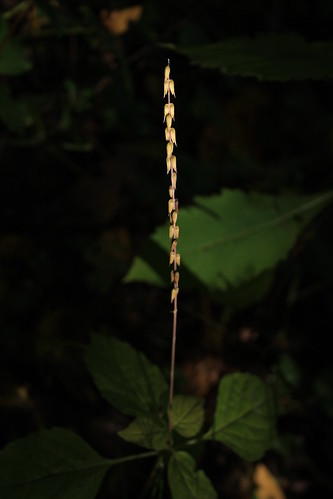
Count the seeds: American lopseed, Phryma leptostachya.
(*photo credit)
November 29, 2023 Tolerating Compulsive Counting Folks
Some people have compulsive behavior in one or other way. I inherited one from my dear departed mother who spent some of her final wheelchair tours counting the number of parked cars in the senior citizen parking lot. That is okay for seniors, and yet I have counted different things for much of a lifetime since learning the art. When undergoing testing upon entering the Jesuits, I was asked by psychologist Fr. John Reinke what happens when I missed counting telephone poles while riding the school bus. I had to confess that I never recalled missing any.
My compulsive counting does not mean that I cannot reflect or converse while counting. Over years one is able to do both -- though counting my daily strokes on a rowing device can be thrown off if the radio reports a series of numbers. At times I count the number of steps while walking and when formerly jogging -- and logged these in my record book faithfully along with phone calls, letters written, e-mails sent, hours spent on major projects, Masses, money expended, times for appointments, miles traveled, daily weather conditions and ranges of temperature, and a host of other numbered items of little major importance. When traveling for years I counted state license plates for each trip, recording on a mental blank U.S. map that would fill as the trip progressed. Why halt the practice, except as eyesight weakened it occurred that straining to see might cause an accident?
Should we be concerned with the quantitative aspects of life (poundage of food grown or eaten, money remaining in the bank account, time it takes to produce a certain product, or minutes of phone time on a credit card)? I highly suspect that my overly quantitative approach is non-appealing to many others, but not all. Recall that Jesus asked the disciples how many thousand were at the first and second multiplication of loves -- and they knew. How important is total accuracy? When they count down for a rocket lift-off, we wonder what happens if they miss a number -- six, five, three, two -- Will it scratch the launch and cause disaster? Counting at least keeps the mind active at all times. But I like to think of counting as praying.
In order to fall asleep some count imaginary sheep jumping a fence, but that would keep me awake. I often count the number and places of counties in a given state, and hope to retain a reasonable record of all 3,000 plus of these. Some things are worth counting -- thus the popularity of rosaries and prayer beads. When does the sun rise or how old are you? Such is the tyranny of numbers. Some get mesmerized by particular numbers like three for the Trinity, four for the four seasons and directions, five for the fingers on one hand, etc. You may have heard of body counts in warfare; how depressing! How long to a graduation or wedding? Does the information hasten the event? If one-third of folks are on default on credit card and other bills, is this partly a failure to count? Perhaps some ought to do more counting in order to refrain from over-spending.
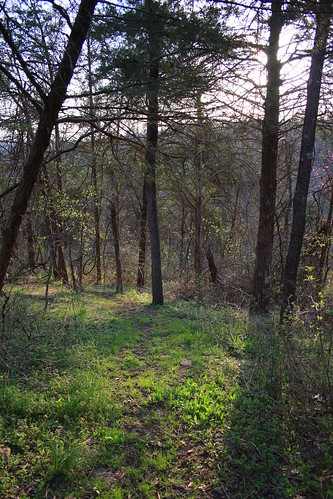
Kentucky forest, sunrise.
(*photo credit)
November 30, 2023 Welcoming Advent and Saint Andrew as Model
Be watchful! Be Alert! (Mark 13:33)
Today is the start of a new Church year when we initiate the holy season of Advent; the time comes with a heightened sense of vigilance and heightened awareness of being followers of Christ. Perhaps that sense of watchfulness is greater this year than others because of both global troubles and the growing climate change crisis confronting us. As true disciples of the Lord we are called to fidelity and the need to always be on guard against the Evil One. It is imperative that we have models to follow and one excellent example has his feast day today, namely Andrew the apostle.
Like his brother Simon Peter, Andrew is a fisherman (Mark 1:16) who is called by Jesus (John 1:44) and eventually undergoes martyrdom, custom says on an "x" shaped cross. An "x," the symbol of Scotland on the UK flag, stands for Andrew, its patron saint. Several passages in the New Testament relate to Andrew; with fellow disciple Philip he conveys the message to Jesus that Greeks want to see him (John 12:22), and so Andrew is a favorite saint of Greek peoples as well.
While we know little about Andrew's missionary exploits, we can highly suspect that he shares with the other disciples the burning ambition at Pentecost to go out to all the world with the Good News. He gives up all to follow Jesus and expects a Messianic Age with immense conquests with Jesus succeeding to the throne of David and Solomon -- and he (Andrew) is a trusty lieutenant. Most likely, Andrew engages in the conversation over who is the greatest among them (Mark 9:32ff). Jesus does not respond by deflating their ambitious spirit; he seeks to convert that spirit into doing good for others, for the powers he bestows can only be used rightly through service to others. If they have the inordinate desire to be "top dog," then selfishness will reign; if they see service as a sacred privilege, then a holy ministry will and (in Andrew's case) does result. Church leaders are called to be servants.
Parents sacrifice so offspring can have a better world. Jesus' coming tells us to make even broader sacrifices for all our neighbors, not just blood relatives and direct descendants. If we start to see the Divine Family as the total group to which we are called (as Andrew does), then selfless deeds take on a deeper significance and urgency. Ambition is still present in many of Christ's followers and it ought to be -- for we, like the apostle Andrew, desire to do great things. However, ambition extends to an entire world in a spiritual sense; we are called, like Andrew, to undertake this mission in an evangelistic spirit, for conquest is not for self but for the Lord.


